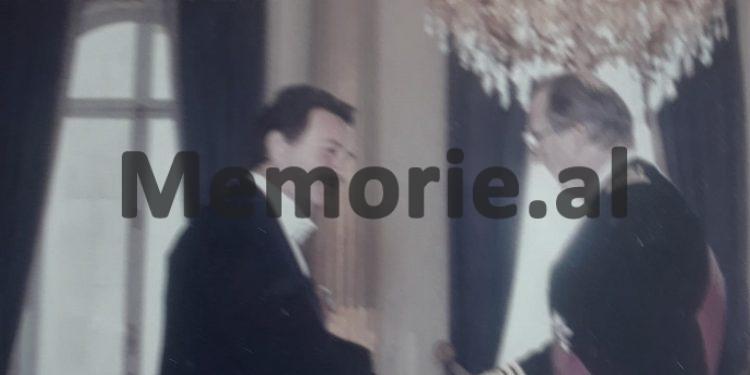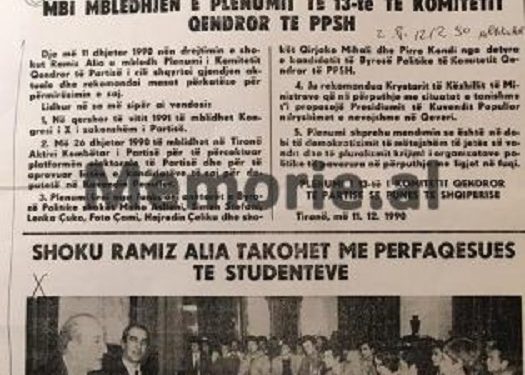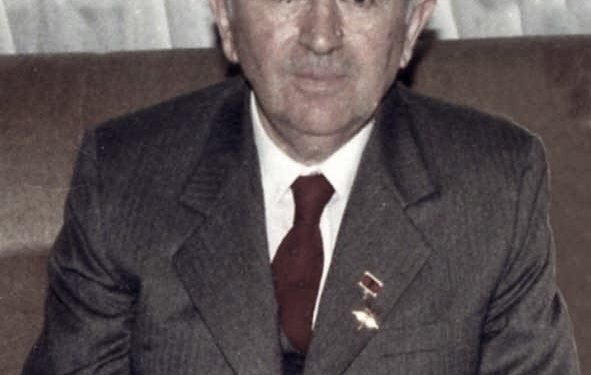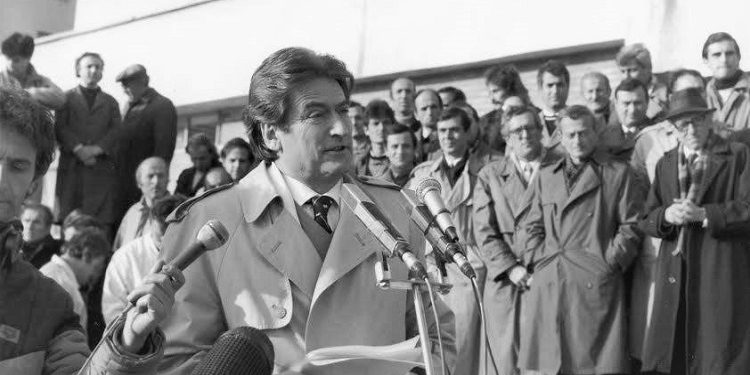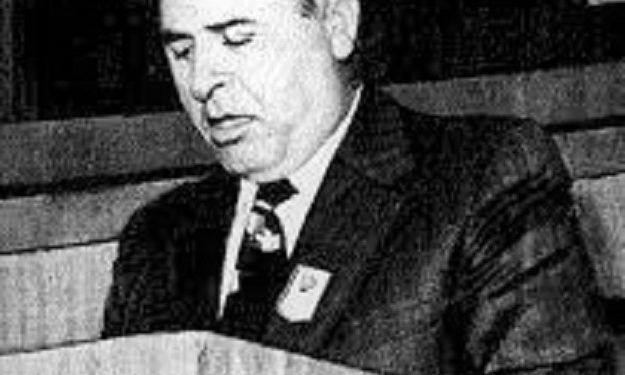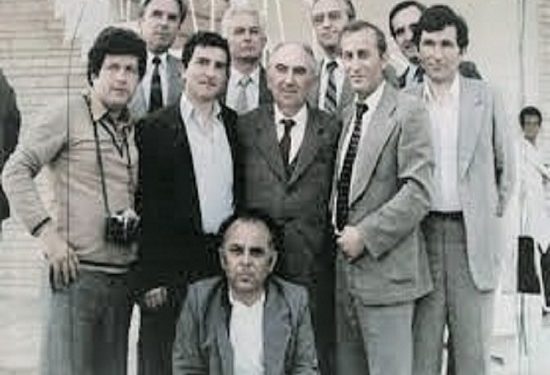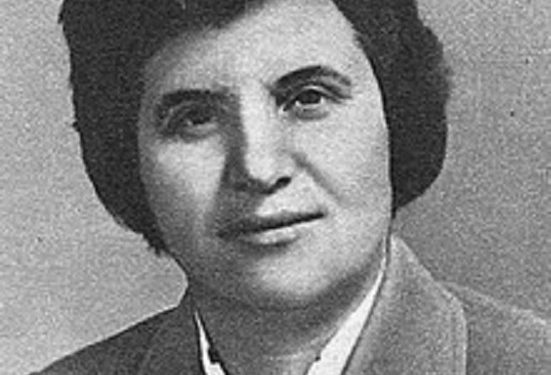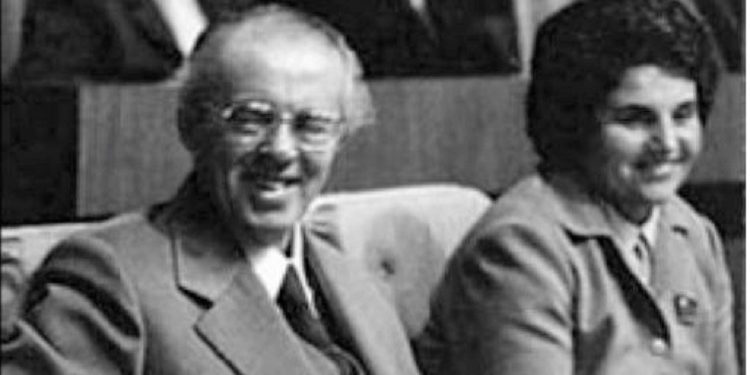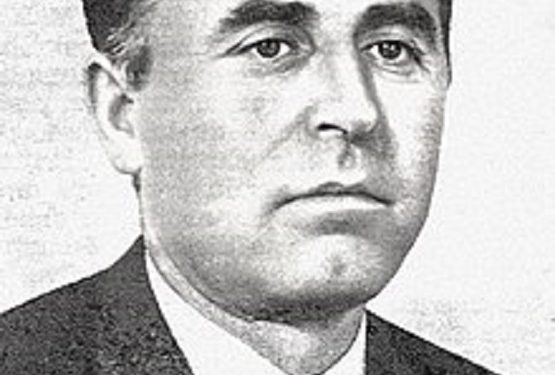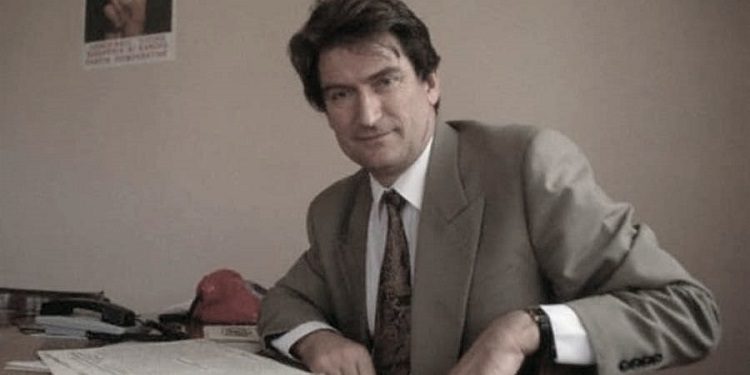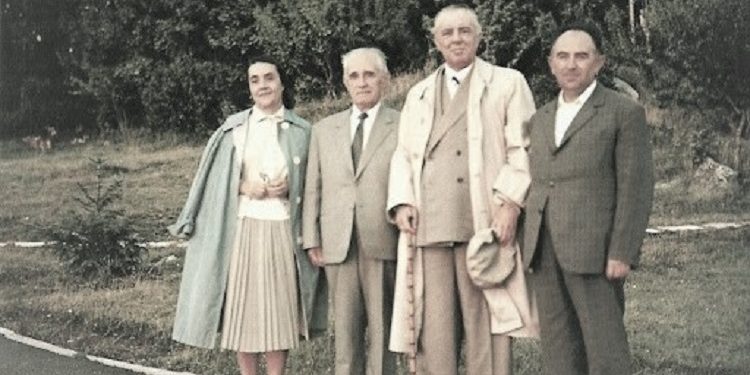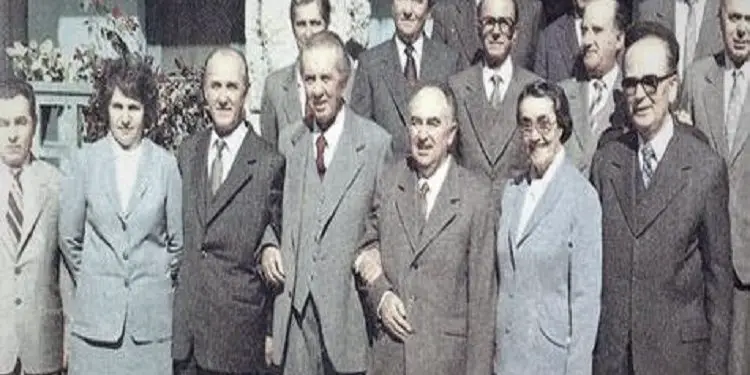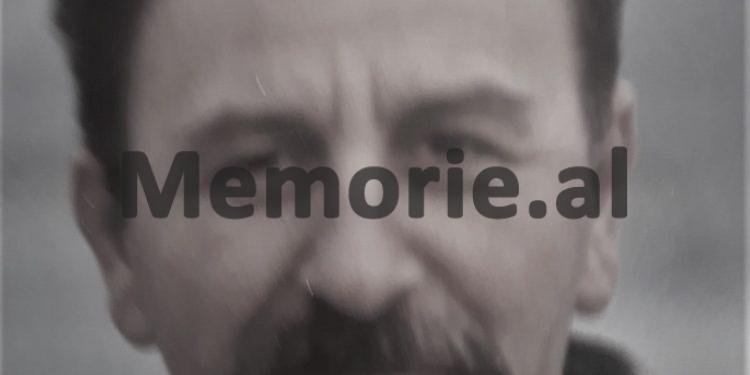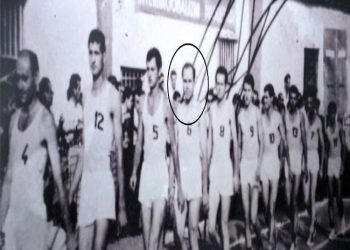By Bashkim Trenova
Part forty-four
Memorie.al publishes the memoirs of the well-known journalist, publicist, translator, researcher, writer, playwright and diplomat, Bashkim Trenova, who after graduating from the Faculty of History and Philology of the State University of Tirana, in 1966 was appointed a journalist at Radio- Tirana in its Foreign Directorate, where he worked until 1975, when he was appointed journalist and head of the foreign editorial office of the newspaper ‘Zeri i Popullit’, a body of the Central Committee of the ALP. In the years 1984-1990, he served as chairman of the Publishing Branch in the General Directorate of State Archives and after the first free elections in Albania, in March 1991, he was appointed to the newspaper ‘Rilindja Demokratike’, initially as deputy / editor-in-chief and then its editor-in-chief, until 1994, when he was appointed to the Ministry of Foreign Affairs with the position of Press Director and spokesperson of that ministry. In 1997, Trenova was appointed Ambassador of Albania to the Kingdom of Belgium and to the Grand Duchy of Luxembourg. Unknown memories of Mr. Trenova, starting from the war period, his childhood, college years, professional career as a journalist and researcher at Radio Tirana, the newspaper ‘People’s Voice’ and the Central State Archive, where he served until the fall of the communist regime of Enver Hoxha, a period of time when he in different circumstances met many of his colleagues, suckers of some of the ‘reactionary families’, etc., whom he described with a rare skill in a book of memoirs published in 2012, entitled ‘Enemies of the people’ and now brings them to the readers of Memorie.al
Continued from the previous issue
WITH “HEROES OF THE PEOPLE”
POLITICAL BUREAU AND THE PRESIDENCY
Miti Tona, was the “extraordinary and all-powerful ambassador” of the Party in the Albanian media!
My “meetings” with Ramiz Alia have been more frequent in the distance, especially when I was the head of the Foreign Sector in “Zeri i Popullit”. As I have had occasion to point out before, the Central Committee of the Labor Party also had in its structure a Press Director. The head or director of this Directorate was Miti Tona. Mit was often contacted by phone, but sometimes I also met with him at the Central Committee of the Party. The myth was the intermediate link between Ramiz Alia and the Albanian media. He had a previous career as a journalist but also as an ambassador. In fact, he was equally the extraordinary and powerful ambassador of the Party in the Albanian media. The myth guided the press by conveying the thoughts of Enver Hoxha, which were transmitted to him by Ramiz Alia. He, through his employees, also controlled the articles, information, television broadcasts of the press, television and the Albanian Telegraphic Agency. The Press Directorate was thus the mouth, eye and ear of the Central Committee for the space it covered.
Myth, in communicating with the press, had a practice, which at the time seemed to me, at least, somewhat special. All the messages, even the most delicate, the most important ones, were given by him only orally. It happened to me that he called me to the Press Directorate to give me the ideas that I should address in an editorial, for a concrete problem from foreign policy. He read these ideas and I had to keep notes. After writing the article, I had to pass it on to Miti Tona and he, as far as I could understand, passed it on to Ramiz Alia. The latter could also make a suggestion or leave a note on the front page of the article. After the article was seen by Ramiz Alia, I went to get it to the Central Committee. If there was any suggestion on the side, Miti would read it to me to keep a note. Then he wiped it with the eraser.
With Myth you were never sure, even after the article was viewed and given for publication. I remember, for example, a case where I was suggested to emphasize an idea more, to highlight it more at the beginning of the article. After doing what I was asked to do, I called Miti Tona to read the part of the article where I had intervened. He had asked me this himself. After I finished reading, I heard Miti Tona on the phone saying to me: “Okay, if you did everything I asked you to do”. But if I had not done them, why did he not tell me, why did he agree for the article to be published?! I do not have a bad opinion of Myth Tona. I’m sure his behavior had nothing to do with his own character. He certainly reflected the same attitude of someone above, Ramiz Alia. This was a master of ambiguous statements, of attitudes that excluded each other, of taking care to be inside in every situation, that is, of avoiding any responsibility. Editorial articles on foreign policy were said to be written on the basis of ideas given by dictator Hoxha himself. Many of them have even been published after a few years in his works. Probably a factor as to why they’re doing so poorly. This would certainly be worth it if the dictator could have thought that any of his ideas had not been realized as he had thought!
I remember a time when Miti Tona called me to the Central Committee to give me for publication an editorial that dealt with the problems of the Iranian Islamic revolution. The item was inserted in a folder. I did not open the file to see if the article was complete there or not. It just did not cross my mind. I sent the article to the printing house. In the evening, checking the materials sent for publication, I noticed that a page was missing. I got Mit on the phone to talk about this fact. He told me to go to his house. So I did. As soon as he opened the door for me, he asked the question: “Hey, did you lose it”? Then he told me to go inside. He checked some files. I finally found the page I was missing. If she had not found it, it would have turned out that I had lost it, even though it had not been given to me. To lose a page from an article, which could have been written by the dictator or according to his ideas, meant that you had missed every opportunity for a normal life going on. The consequences would be very severe. Since the “lost” page was found, Miti invited me to have a glass of brandy and then asked me about the health of the family members.
The most delicate was the message given to me by Miti Tona, certainly not from his head, to be careful in the materials we published from the Marxist-Leninist press of the time as well as in the letters written to Radio Tirana by its foreign listeners. Generally these materials or letters were filled with endless praise and hymns for Enver Hoxha. The message was that they should be downloaded from any excess of this nature, and then forwarded for publication. Sometimes such materials were sent to us by the Albanian Telegraphic Agency. According to the order, I made occasional downloads and then called Miti Tona to let her know. He, when the material was brought to the Editorial Office by the Albanian Telegraphic Agency, told me that the changes should be made by the Agency and the entire press. For this he charged me to talk to the director of this institution, my old friend and colleague, Taqo Zoton. Normally the Telegraphic Agency did not have to take “instructions” from me. She was not dependent on me or the “Voice of the People”. Miti Tona himself would have to communicate with the Telegraphic Agency about the changes that needed to be made. He did not do that. Our myth, of course, knew his rights and powers, duties and responsibilities. He knew that none of this could in any case be delegated to anyone else, no matter how trustworthy, smart, loyal, glorious or heroic he was.
Myth had been elected press director at the Central Committee and he, of course, knew many of the secrets of working in this giant apparatus. He knew well the vices of each other, of Ramiz Alia or even of Enver Hoxha, the shaking, the shocks, the eliminations even for a completely vain suspicion caused by a bad mood, by a dissatisfaction caused for nothing. To me, Miti Tona’s behavior was a reflection of this murderous reality, an attempt to escape him by victimizing, if necessary, someone else. However, I must say that I do not know any of the press workers of the dictatorship, who was condemned by a word or denunciation of Miti Tona.
The congratulatory letter that Enver Hoxha made to Miti Tona on the occasion of his retirement!
I was with some colleagues of “Voice of the People”, among them Albert Shala, at the house of Miti Tona on the occasion of his retirement. It happened that during our presence, Haxhi Kroi and Ajet Simixhiu also came there, who at that time were in the group of instructors close to the dictator. They brought Miti Tona a congratulatory letter with kind words from Enver Hoxha. The myth, on this occasion, said: “This is the happiest day of my life.” When we left his house, I said to Albert Shala: “Did he wait 60 years to find the happiest day of his life?” Maybe Miti was right. Reaching retirement age without being convicted or judged as an enemy, he had reached the happiest day of his life. All the other days, for years, he had lived with fear hidden in his heart and mind, with the alarm of a possible phone call from Ramiz Alia, the chief press officer at the Central Committee. Ramiz Alia had shown before how he had left his friends in the mud when Enver Hoxha asked for this, or when the rescue of his skin demanded this.
The proposals that Berisha made to me for high duties and functions!
Writing now about the message that Miti Tona had conveyed to me to eliminate the excesses and praises that were given to Enver Hoxha, I remember something similar in the beginnings of democracy. In the March 1992 elections, the Democratic Party of Albania, led by Sali Berisha, won convincingly and came to power by throwing former communists into opposition. Many foreign media outlets covered this victory by also writing superlatives about the chairman of the Democratic Party, Sali Berisha. He himself brought to the editorial office of “Democratic Renaissance”, to publish some of these articles translated into Albanian. I took them and prepared them for publication. I dismissed them from what seemed to me like excessive praise and hymns. My reasoning was simple. If this was the case for Enver Hoxha, the dictator, even more so for Sali Berisha, the leader of democracy. Apparently, this time too I was wrong. The next day, Sali Berisha, when he read published the materials he had brought, without the epithets that in a way glorified him, got on the phone from his house, which was near the Editorial Office. He demanded an account as to why he had done so. I tried to explain. It was in vain. I finally said, “I thought so.” Saliu asked me to go and meet him at home. There he used another tone. He even proposed me to become the editor-in-chief of the newspaper, since Mitro Çela, the then editor-in-chief, had been elected MP.
Saliu knew that I did not want to have responsibilities in the newspaper or elsewhere, I did not want to deal with organizational work or be responsible for the work of others, of those I would depend on. He had previously appointed me deputy editor-in-chief of the “Democratic Renaissance” and I asked him to release me from this obligation, to leave me as a freelance journalist. At the 1st Congress of the Democratic Party, he nominated me as a member of the National Council of the Party, I refused by telling him that I was not even a member of the Democratic Party. Sali and I were both in the European Parliament in Strasbourg when the Democratic Party was in opposition. It was the first delegation of the democratic opposition in this Parliament. At the end of the visit, Sali Berisha proposed me the position of Head of Foreign Relations of the Democratic Party. I did not accept his proposal, telling him that I do not know English and that knowing this language, in my opinion, was a necessity for what would be in this post. Berisha then appointed Alfred Sereqi there. With the overthrow of communism, Sereqi became Albania’s foreign minister.
Even in the 1992 elections, Berisha sent two members of the Democratic Party leadership, Safet Zhulali and Blerim Çela, to propose me to run for the Democratic Party in the Dibra area, in northeastern Albania. My father was originally from Dibra. The victory of the Democratic Party in these elections was very certain. With Safet and Blerim, according to the conversation we had on the phone, we met at the intersection of “Dibra” street with “Barrikadave” street, where at that time there was a burger. I did not accept this proposal either, which was forwarded to me by these two members of the presidency. I did not see myself as an MP. I evaluated this post with many responsibilities, the realization or non-realization of which would not depend only on me.
They say that Sali Berisha has a strong memory. I believe that when he proposed me to run the newspaper “Rilindja Demokratike”, he had not forgotten everything I said above. “I know, said Saliu that you do not want, but take it for a while.” His proposal seemed like a caloric gesture to me. I had “diminished” his glory and he proposed to me a promotion. In these circumstances I agreed to run the newspaper for a while. Years later I realized that Sali Berisha was offering and distributing posts to people who criticized him. He used his power to corrupt his opponents, to silence them. I was not his opponent. Maybe he saw me as such, since I deleted the superlatives as I did with Enver Hoxha, always without being his opponent. However, he kept his word. One day, while he was the president of the country, he called me to the Presidency and told me that he had not forgotten that I was the editor-in-chief “for a while …”! But let’s go back to the communist era.
When Pali Miska, member of the Politburo and first secretary of the Fier District Party Committee, demanded that measures be taken against me!
In my house, as I said above, on a May 5, besides Ramiz Alia, Lenka Çuko also came. I do not remember if she came before or after the visit made by Ramiz Alia. It would again be Niazi Çepani who would propose our house as the host of Lenka Çuko, another member of the Politburo of the Labor Party. I have nothing left in my memory from her visit. Lenka was one of those who rose by crane in the highest spheres of power from the dictator, who needed others simply and only for collegial decor and to be beheaded if he needed their own heads. In this picture, people like her, as happy as they could be, were also unhappy. They, even if they wanted to, could not but accept the “honor” and the task assigned to them by the Party. This thing will never be forgiven. On the other hand, entering the dome, no matter how loyal they were to the dictator, they would never be sure of the end that awaited them. All their predecessors, known as Enver Hoxha’s conspirators, had ended up with their heads in the pan.
I met Lenka Çuko once again during the years when I worked in the General Directorate of State Archives. This time it was me and some colleagues we went to visit at home. I do not remember anything from this visit, except the fact that in the waiting room we were not the only visitors and that we, after a while, was added Pali Miska, also this one raised by “crane” by Enver Hoxha in the Politburo as its member. With Comrade Paul, I had already had an unpleasant “meeting” in the distance.
I mentioned somewhere that I wrote in one of the first issues of the “Democratic Renaissance”, about the troubles that were created during the visit of the director of the Library of the Greek Parliament, Mr. Panayotis Christopoulos, in Albania. At that time I was working in the General Directorate of State Archives. In this article I did not mention that a few days after Christopoulos’s return to Athens, a letter signed by Pali Miska, a member of the Politburo and at the same time the first secretary of the Fier District Party Committee, arrives at the Central State Archive. In this letter, Pali Miska expressed his anger for the “great and serious concerns” that I had caused to the citizens of Fier, accompanying Christopoulos to Kolkondas! He also demanded from the General Directorate of State Archives that a punitive measure be taken against me and that this measure be made known to him as well! Pali Miska, as well as several other members of the Politburo, had been catapulted in recent years by Enver Hoxha, into the highest hierarchy of communist power.
He, like others like him, had no merit, had been an anonymous. This was also his “merit”. This is how the dictator wanted his closest collaborators. Such people, aware of how much they were worth, climbing to the top of the communist dome would be eternally indebted to the dictator, would serve him blindly not as dignified loyalists, but as disgusting reptile servile. I believe that in this logic was also the letter of Paul Miska. Lenka Çuko, Pali Miska, and any other member of the Politburo, such as Muho Asllani, were the object of numerous anecdotes among the people during the dictatorship. Ordinary people have caricatured them quite easily.
Lenka, Pali and others like them, being very ordinary people, who all of a sudden became “personalities” of the Albanian political life, I think they found it difficult, impossible to return to their previous reality or to evaluate right new realities, democratic changes. They feared the loss of privileges, but perhaps also of responsibilities that weighed on their consciences. As it appears from the minutes of the Politburo, in its meeting of December 11, 1990, speaking about the Student Movement, which preceded the Democratic Movement in Albania, Lenka Çuko stated: “Some hooligans have gathered there, who want to make the law”. Positioning itself against political pluralism, she also stated: “We should not allow other parties to be created.” In the same line, a few days later, Pali Miska would declare: “We must stand up for our Party and Enver Hoxha”.
Why did I delete Lenka Çukos’s name in the articles of the newspaper ‘Rilindja Demokratike’?
In the beginnings of the Democratic Movement in Albania, the Political Bureau of the Labor Party was, rightly, the target of the opposition press. I have felt sorry for Lenka Çuko several times. It is more accurate to say that I felt sorry for her daughter, Edlira Çukon, with whom I had worked at the Central State Archive. Thus, if in a critical article, which was brought for publication in “Democratic Renaissance”, some of the names of the members of the Politburo were mentioned, I deleted the name of Lenka Çuko and added “etc.” instead. I did not do this to protect him. Her fate, like that of all others like her, would not change whether or not her name was mentioned in an article in the newspaper “Rilindja Demokratike”. The candle was lit for them.
Among the members of the Politburo, I also met Adil Çarçani. In my youth I saw him several times when he came to visit my neighbors’ house on “Dervish Hekali” street. Opposite our house lived the family of Resh and Jolldyz Spahia, who came as refugees from Kosovo. Their daughter, Hava Spahija, was married to Adil Çarçani. They were known together in the years of anti-fascist armed resistance. She often came to see her parents. Most often her daughters came. Rarely Adili. I was friends with Jashar Spahi, the eldest son of Reshit and Jolldyz. He worked as a technician in the “Enver Hoxha” Plant. He had gained nothing; no privileges had been done to him as well as to the others in the family as they were related to Adil Çarçani. His younger brother, Sitkiu, was a teacher, while his younger sister, Melihaja, who had once played an actress at the People’s Theater, ended up as a caretaker in a kindergarten. They were all simple, hospitable and kind people. Adjacent to their house, our neighbors had set up a wooden hut where they kept a cow. Every morning I saw Jolldyzin, when she went with a small herd to milk her cow. Thus it somehow helped the family economy. One day they left the house where they had lived as my favorite neighbors. Since then we have hardly met again. Memorie.al
The next issue follows




